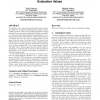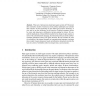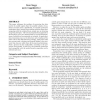139
click to vote
ATAL
2003
Springer
15 years 5 months ago
2003
Springer
Personalized information agents can help overcome some of the limitations of communal Web information sources such as portals and search engines. Two important components of these...
117
click to vote
ATAL
2003
Springer
15 years 5 months ago
2003
Springer
We address the problem of constructing multiagent systems by coordinating heterogeneous, autonomous agents, whose internal designs may not be fully known. A major application area...
140
click to vote
ATAL
2003
Springer
15 years 5 months ago
2003
Springer
We develop a new false-name-proof double auction protocol called the Generalized Threshold Price Double auction (GTPD) protocol. False-name-proofness generalizes strategyproofness...
122
click to vote
ATAL
2003
Springer
15 years 5 months ago
2003
Springer
Debugging multi-agent systems, which are concurrent, distributed, and consist of complex components, is difficult, yet crucial. In earlier work we have proposed mechanisms whereby...
123
click to vote
ATAL
2003
Springer
15 years 5 months ago
2003
Springer
What sort of democracies should open agent societies be? We present three normative models of democracy from political philosophy and consider their relevance for the engineering o...
125
click to vote
ATAL
2003
Springer
15 years 5 months ago
2003
Springer
What distinguishes e-commerce from ordinary commerce? What distinguishes it from distributed computation? In this paper we propose a performative theory of e-commerce, drawing on ...
117
click to vote
ATAL
2003
Springer
15 years 5 months ago
2003
Springer
This paper addresses the problem of protecting the data carried by mobile agents from the possible attacks of malicious execution hosts. Specifically, we consider protection mecha...
141
click to vote
ATAL
2003
Springer
15 years 5 months ago
2003
Springer
We describe a general mechanism for adaptation in multiagent systems in which agents modify their behavior based on their memory of past events. These behavior changes can be elic...
121
click to vote
ATAL
2003
Springer
15 years 5 months ago
2003
Springer
Verification and compliance testing are required if agents are to be delegated responsibility for legally binding contracts, for example in electronic markets. This paper describes...



